Party dress sheath too tight - complement it with a handmade fabric rose. Too boring for everyday life - decorate it with an original contrasting flower. I want to stand out from the crowd of brides - add a bright flower from ribbons to the dress.
Small or voluminous, simple or multi-layered flowers become an extraordinary highlight of the outfit, attract attention and add a considerable amount of romanticism and charm to the image.


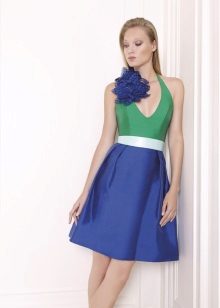
Most importantly, such a decorative work can be done independently from improvised materials.
A drop of imagination, knowledge of small tricks that we will tell you about, and step-by-step creation of simple flowers from fabric will help you create your own unique masterpiece.
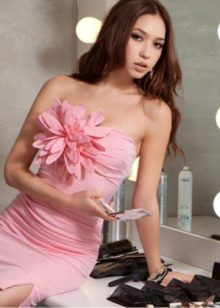


Stages of creation
Pattern
If you did not find ready-made petal templates, then you can draw them yourself using the ruler and pencil.
An ordinary circle can also serve as a pattern. It is made by a compass or by circling a glass, cup or any round object.
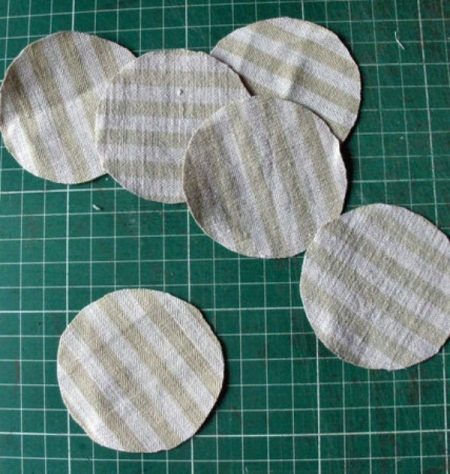
There is another unusual and therefore little-known way - taking "measurements" from a living flower.
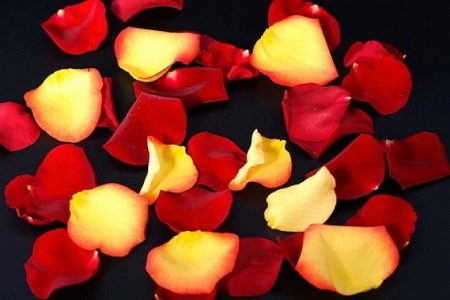
- Take the most beautiful flower and carefully disassemble it into petals.
- Circle each of them on cardboard, then cut along the contours. It can be difficult with very convex petals. In this case, circle them with a slight digression.
- In this way, the leaves are also circled, only at the base of the leaf blade you need to make a small ledge if you attach it to the stem.
- Cut elements are cut on the fabric "oblique". To circle the patterns, it is recommended to use a ballpoint pen, since a pencil often leaves a dirty mark. The trace of the handle during cutting remains beyond the contour.
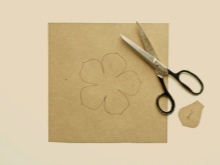
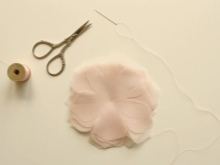
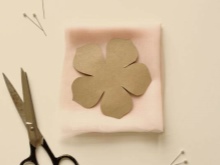
Fabric selection
Almost any fabric of any density (organza, silk, satin, chiffon, crepe de chine, velvet, linen) is suitable for a flower.
It is advisable to choose a natural material, since it will stretch well and corrugate with ease.
This is not the case with synthetics. It undergoes rapid overheating, which leads to deformation of the flower element. In a word, experience, strength and patience require more.

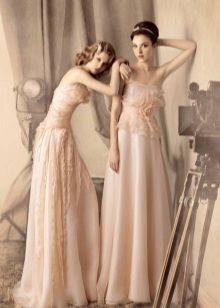
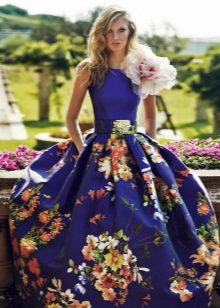


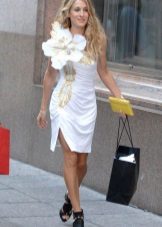

Petals coloring
They resort to coloring when it is necessary to achieve the maximum naturalness of the flower. Aniline and confectionery dyes, Rainbow ink, gouache and photo colors are suitable.
A piece of fabric can be completely dyed, or you can individually petals.
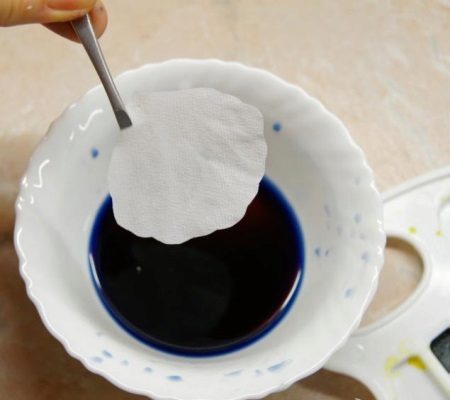
The petals are moistened with water and laid out on glass. Use the brush to apply the desired shade. To make the shade bright, paint is bred with cologne. The alcohol base also allows the product to dry faster.
Material preparation
To keep the flower in shape, the fabric can be starchy or treated with a gelatin solution, which is very simple. In a glass of cold water, dilute 2 tbsp. tablespoons of gelatin and let swell, and then heat in a water bath.
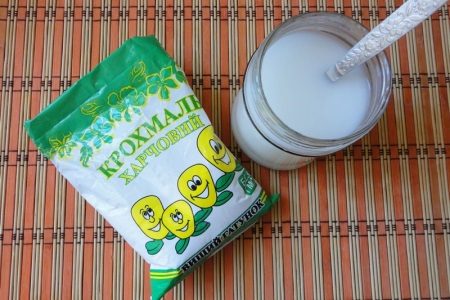
In the finished hot solution, lower the fabric and squeeze. Dry on a fishing line. When it dries, iron with a warm iron.
It is important to note:
- starching is done after dyeing the fabric;
- fine matter is starch strongly, dense starch is weaker. Velvet is smeared with a solution only on the wrong side;
- if the material rustles, then it is ready to work. Otherwise, it will be difficult to form petals due to a weak solution or sticking of the instruments if the solution was excessively saturated. It is fixed simply. Wet the fabric, let it dry and repeat the process from the beginning.
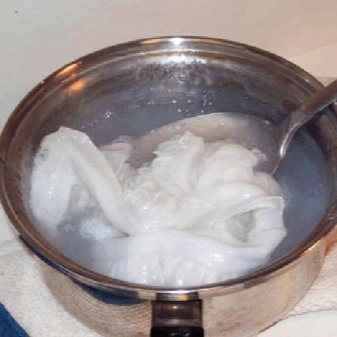
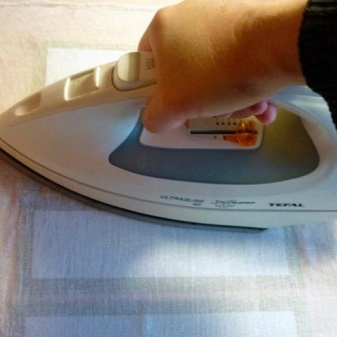
Shaping
Bend the petals in different ways, depending on the fabric:
- The contours of elements of light material are burned with candles or a lighter. Only during operation there should be no drafts.
- You can use the tool bulka. The petal from the heated tool will round. Curl the edges with a curling knife, a special hook. A heel will give a bulge to the petal.
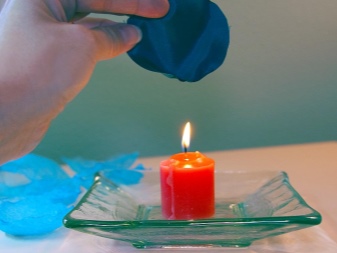
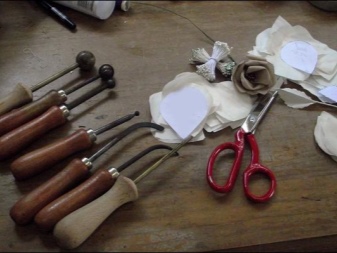
Making stamens and pestles
Similarity to the real flower is achieved just due to the stamens.
They are made of threads that are impregnated with a solution of starch or gelatin, and a paint color in an amount of about 30-40 pieces. The latter can be replaced with melted wax.
Pestle needs paper-wrapped wire and cotton balls painted in the appropriate color.
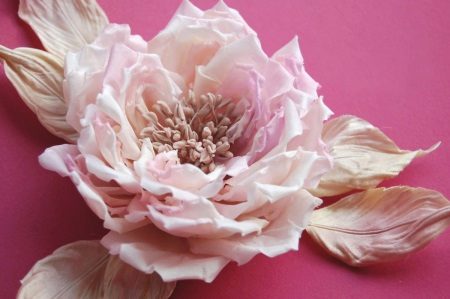
Flower core
The heart of the flower is decorated with buttons, cotton, beads and everything that may be at hand.
It is recommended to use PVA glue, which leaves no residue on the fabric.
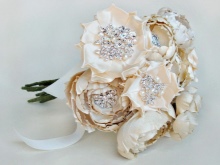
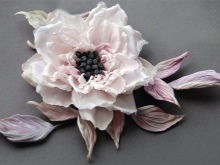
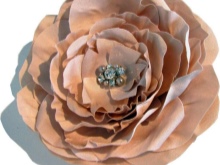
DIY flower making
And now let's move on from theory to practice.
Flower with a lace middle
The presence of a small patch of dense fabric of interesting colors can be the beginning for creating such a pretty flower.
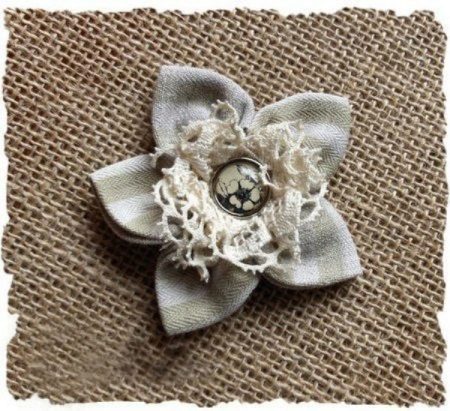
- Cut circles of the desired diameter.
- Fold each item in half several times.
- Seam the bottom edge of the resulting petals.
- Collect all the elements in one flower.
- Attach a piece of lace or knitted border in the center of the flower.
- Attach a button that will hide the seams.
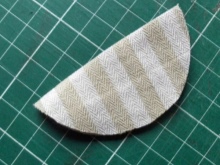
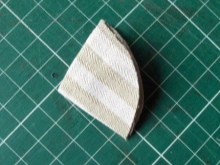
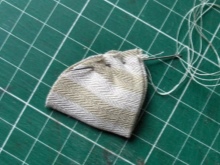
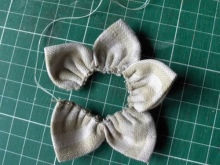
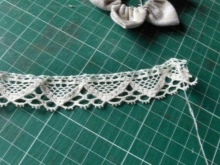
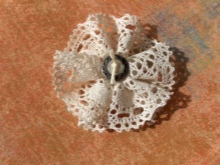
rose flower
No wonder the rose is considered the queen of flowers - a symbol of beauty and love. It is simply a sin not to decorate your dress with such charm.
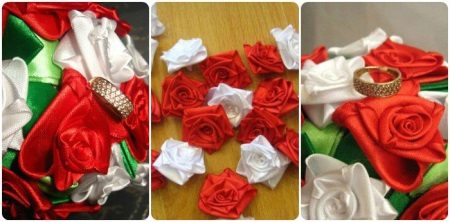
We will need a red or pink ribbon 35 cm long.
Bend the edge away from you and start wrapping the rose. Fasten the base with a thread, not reaching the fold line.
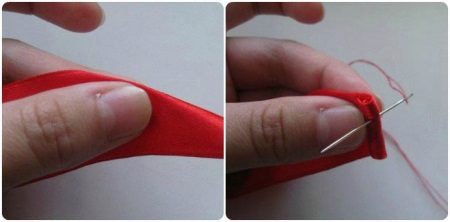
Sew the end of the tape from the wrong side, securing all layers.
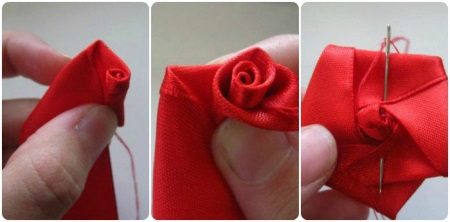
From satin and chiffon
This beautiful flower is the easiest way to create flowers from circles.In this case, it is desirable to use different material.
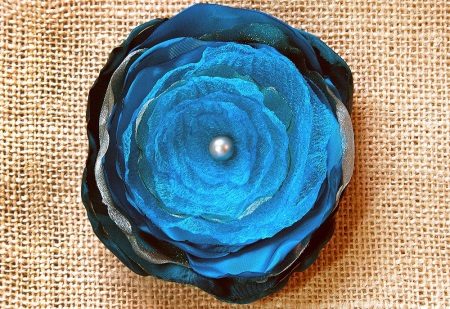
- Cut circles of different diameters, at least 5 pieces.
- Burn the edges.
- Gather the petals into a flower, starting with the largest.
- Chip all layers neatly with a pin.
- Sew on the decor by holding the petals together.
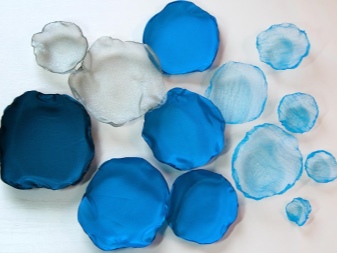
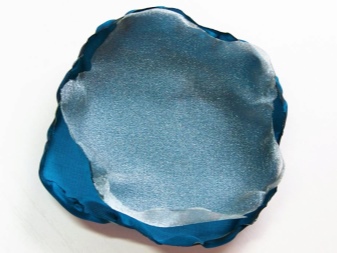
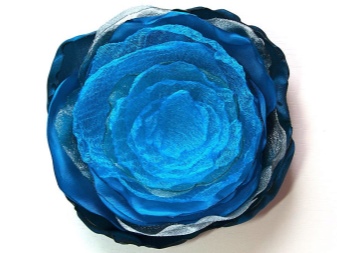
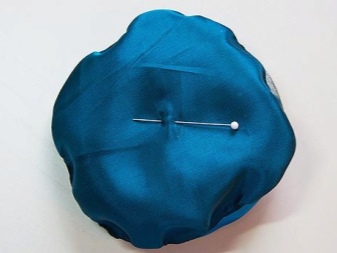
From organza
A stencil in the form of divided petals will serve as a pattern for a lush flower from organza. The fabric can be selected in different tones and different textures.
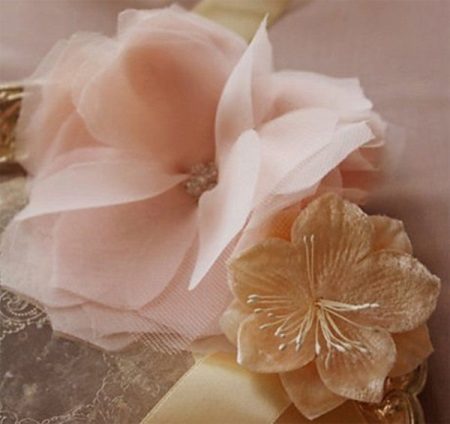
- Fold the material in several layers to make a square. In size, it should be larger than the template.
- Circle its contours and carefully cut. The number of petals depends on the size of the flower and the thickness of the fabric.
- Overlay the cut shapes on top of each other and align the layers, thread all the petals in the center with a thread.
- Beads and beads can decorate the middle.
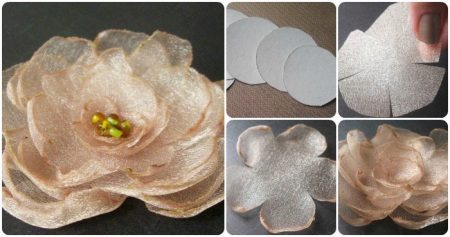
From tapes
We want to share another option for creating a flower from ribbons.
Of the necessary material, you only need ribbons of different colors, which can serve as pieces of any fabric, a thread with a needle and beads for decoration.
Note that the wider the ribbon, the larger and more magnificent the flower will be.
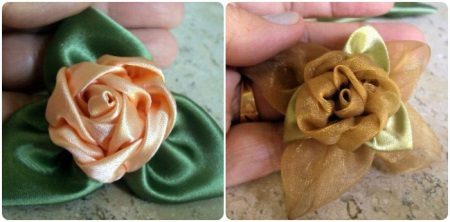
Take a tape 50 cm long and wrap one edge to make a triangle.
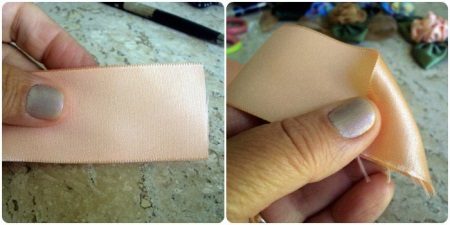
Turn the resulting sharp corner and fasten with a thread.
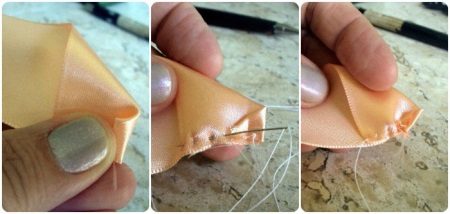
Then we collect the ribbon in the form of an accordion.
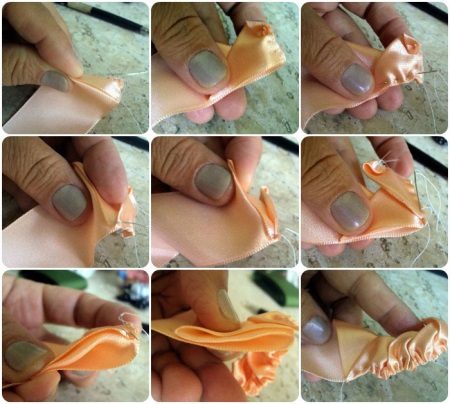
Gather the flower from the picked ribbon and secure with a thread.
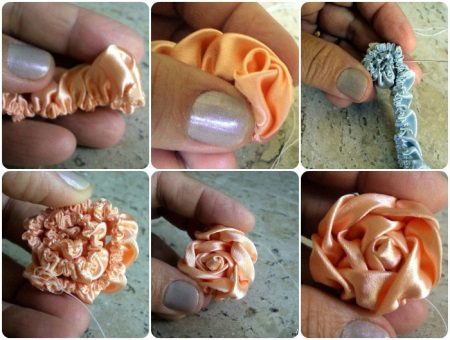
It remains to make leaves.
- Fold a green ribbon 10 cm long with a triangle.
- Sweep and pull off its base.
- So make a second leaf.
- Collect the flower arrangement together and decorate with beads.
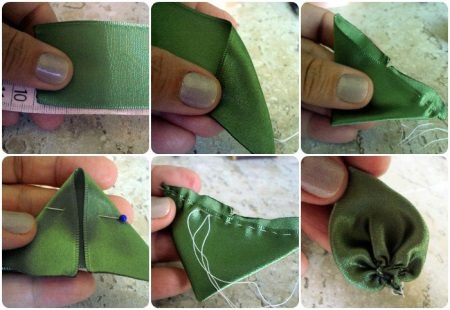
Kansanshi flower
This technique requires perseverance, but the original colors of the fabric make up for this drawback. The sizes and colors can be very different, as well as the methods of their use, while the material costs are minimal.
Flowers are created from a satin ribbon, using the Instant Crystal glue, decorative elements, cardboard, scissors and a thread with a needle.
There are different ways to create flowers using the kanzashi technique. We will consider a few.
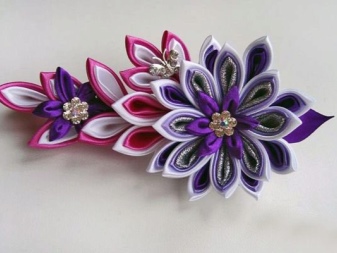
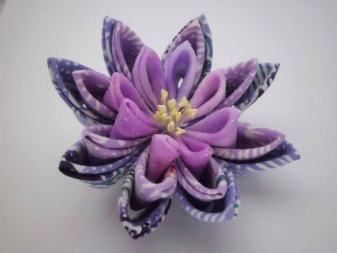
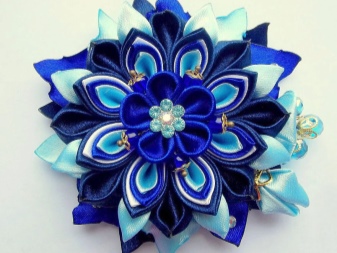
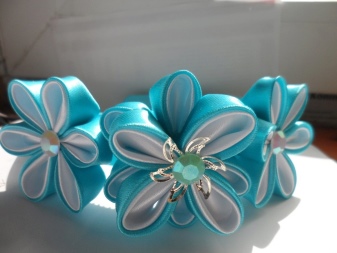
Aster
To make a beautiful aster, cut the tape into segments of 7 cm in length. The number of future petals is done at will.
Fold each piece in half and cut at an angle with a soldering iron to form the top of the petal.
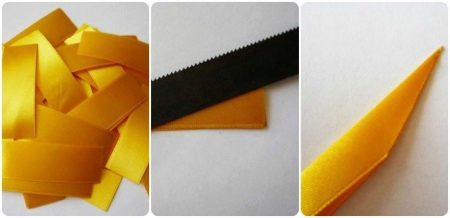
Wrap the bottom of the petals in the opposite direction and scorch the edges, so the ends of the tape will connect.
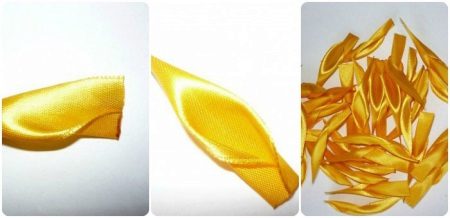
From thick paper, cut a circle corresponding to the diameter of the flower. Glue the petals, starting from the edge of the circle, gradually filling the entire space.
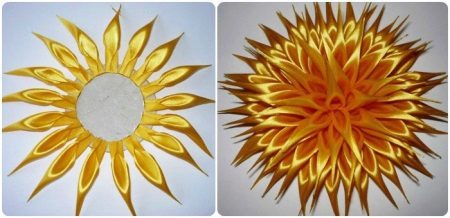
Convex flower
A convex large flower is made as follows:
- Cover the ball with a plastic bag. The size of the finished product depends on the diameter of the ball.
- Make the petals.
- 7 petals connect in a circle with a thread and fasten. There will be a small flower that needs to be attached in the center of the ball.
- Glue the second row of petals between the parts of the first row.
- Seal the petals in rows, forming a flower of the desired volume.
- When the glue has set, carefully remove the ball and the plastic bag.
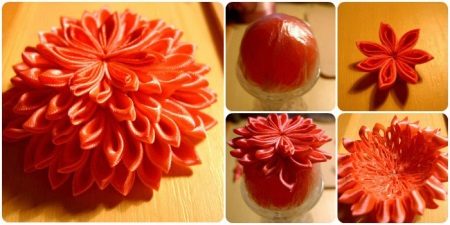
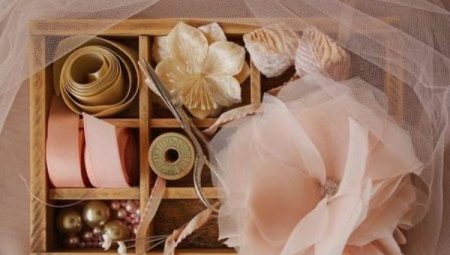











Everything is so beautiful! And it seems simple)) but in reality ... It's scary to start)